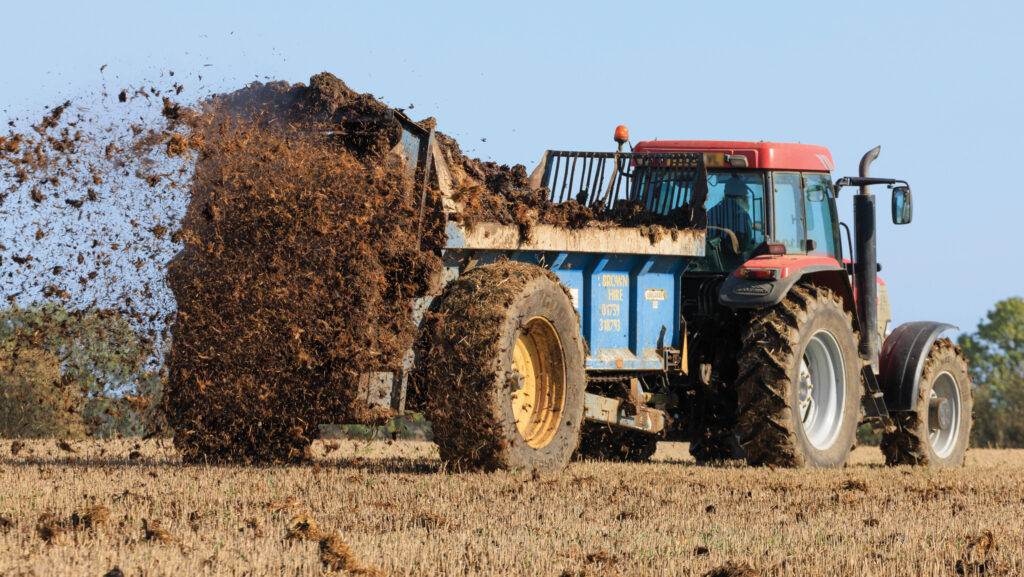Defra launches ‘snap review’ of autumn muckspreading
 © Tim Scrivener
© Tim Scrivener Alarm bells are ringing about the future of spreading organic manures in the autumn in England, after Defra launched a snap review of the statutory guidance used by the Environment Agency to apply the Farming Rules for Water.
The rules, which were introduced in 2018 and aim to prevent water pollution from nitrogen and phosphate caused by farming practices, have been enforced by the Environment Agency (EA) ever since.
See also: River Action considers appeal in Farming Rules for Water case
The agency’s approach is based on advice and guidance, rather than prosecution.
However, this approach has been under scrutiny for some months, following a court ruling in May 2024 that suggested current Defra guidance does not interpret the regulations correctly (see “Defra under pressure to change its guidance”).
Crop need
Central to the challenge is the crop need for nutrients at the time of application.
While the Defra guidance says autumn spreading is acceptable to meet a crop’s “total need” over a full crop cycle, the EA argues that there is no “immediate need” for nitrogen at this time of year.
Rather than changing the original legislation, it seems there will have to be an amendment to the Defra guidance.
This was originally expected to take place in September 2025.
However, in an unexpected move, industry organisations have been meeting Defra officials over the past fortnight to examine the issue.
Threat
Sources involved with the review say the outcome could pose a serious threat to the use of manures on farmland.
One concern is that autumn muckspreading will have to end, except in the case of grassland and oilseed rape where an immediate crop need is identified.
Of greater concern, however, is if the crop need for nutrients at the time of application is extended to include phosphate.
There is a chance then that all manure applications could be banned, as the low application rates required would be impossible to apply.
“That’s the worst-case scenario,” said one source close to the discussion.
“This ruling includes biosolids and digestate as well as farmyard manure, so could send shockwaves throughout the whole industry.”
Consequences
NFU vice-president Rachel Hallos, who oversees water issues for the union, expressed her concern at the speed of the review and the potential consequences.
“Farming Rules for Water is very complex,” she said.
“We don’t believe you can fulfil a rapid review of something so complicated. It needs a proper, industry-wide consultation, and a more holistic approach to how we deal with this.”
Mrs Hallos also pointed to the folly of “farming by the calendar” given the vagaries of the weather.
“Over the past 18 months we’ve experienced some extremely wet weather, which limits our ability to get on the land.”
Industry bodies involved in the review are pushing for a retention of the statutory guidance, with some agreed modifications.
Defra declined to comment other than to say said it was working closely with farmers and other partners “to find practical solutions”.
Defra under pressure to change its guidance
The snap review being undertaken by Defra into its guidance on the Farming Rules For Water comes in the wake of two separate legal challenges.
In a case brought by environmental group River Action against the Environment Agency earlier this year, the judge said the spreading of organic manures on farmland should only be done to meet a crop’s “immediate need”, in order to reduce the risk of pollution.
While this was not a part of his ruling on the specifics of the case, he made clear his wish for Defra to take on board “the correct interpretation of the 2018 regulation” in its guidance – that muckspreading should not be allowed if there is no immediate crop need.
Further pressure for Defra has come from the Office for Environmental Protection (OEP).
In response to a separate complaint by WWF-UK and green group Client Earth, it has launched its own investigation.
“The OEP believes that the statutory guidance may be unlawful as some of the wording is not consistent with the regulations themselves,” said Helen Venn, the OEP’s chief regulatory officer.
“This guidance is likely to be relied upon by farmers and may therefore lead to breaches of the regulations when applying manure to the land.”
The OEP has given Defra secretary Steve Reed until 13 January 2025 to respond.
If the OEP is still not satisfied, it can launch a full High Court hearing to try to secure the changes it is after.
